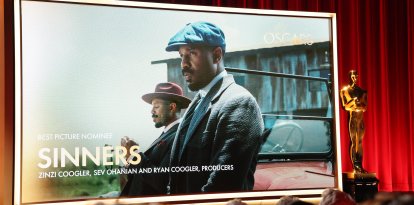'Simón': The unwavering determination of Venezuelans to be free despite repression
Diego Vicentini, director of the film, talks with Voz Media. His intention, he assures, is to show the world the repression and torture of the dictatorship.

Captura de video (
All Venezuelans have been "Simón." Or at least they identify with him. That is what many feel after seeing the Venezuelan film that was nominated for the Goya and the Platinum Awards which tells the story of how Venezuelans were repressed and tortured by the Nicolás Maduro regime in the 2017 protests.
The story of this film tells how traumas occur and torment Simón (Christian McGaffney), a Venezuelan student leader who fled his country after being unjustly imprisoned and tortured by the Chavista dictatorship. Arriving in the United States, the protagonist faces a series of challenges that force him to recount, remember and try to overcome his bloody days as a political prisoner in order to obtain asylum and a long-awaited start from scratch.
The praised production, which shows on the big screen in some 19 countries, emerged at a time when it is known that the Maduro regime murdered more than 10,000 people and tortured almost 2,000 after holding power for more than ten years. Of those tortured in the last year, the majority were women, as revealed by the renowned Venezuelan non-governmental organization Provea.
This is precisely the reality that Diego Vicentini, director of "Simón," wanted to show with his debut film. The intention was never to compete for awards or achieve international recognition. His impulse, he says, was to denounce the tragedy of a country where dissent is a crime that is punishable with torture, and to show the world the horror of a nation where human rights are systematically violated and crimes against humanity are committed.
"Simon," with the help of Vicentini, not only captures with precision and rawness the tragedy that Venezuelans are experiencing but also massively amplifies the message, filling movie theaters in the United States, Spain and South America. The movie is also positioning itself among the most viewed films on one of the most important streaming platforms in the world: Netflix. This success is reflected in the box office numbers, currently at more than $280,000, nine times more than its budget of $30,000.
"The intention was to make visible what Venezuela and all Venezuelans have been through. We could think that it would connect with Venezuelans, but not beyond. In fact, when we planned everything, there was no idea of awards. We didn't even think about a stage of Goya or Platinum. We didn't even think about having to campaign and all that. It has been very nice to accompany the film throughout its process and all the good things that have happened to it," Vicentini said in a conversation with Voz Media.
When the second wave of large protests against the Maduro regime began in 2017 (the first was in 2014), Vicentini was studying outside the country. However, he was aware that in Venezuela, young people of his generation were taking to the streets in an attempt to achieve freedom. Precisely at that moment, in a master's degree that he was studying, the students were asked to make a short film that they were passionate about. Then and there, Vicentini saw the opportunity to contribute to the country without imagining that this project would later become a feature film that would take a vital message to the rest of the world.
"I was in Los Angeles studying film, doing a master's degree, and to graduate I had to make a short film. So, deciding what to make that short film: that year, 2017, was very strong in terms of protests in Venezuela and it affected me a lot, I felt guilty that I wasn't there physically, going out on the streets with my generation, fighting for our country, and so I decided to try to use the short film, or the fact that I had to make one, to try to contribute something to that fight, even if it is making visible what was happening in Venezuela to the rest of the world," Vicentini explained.
The director affirms that with "Simón," he was not only able to send a message and denounce the regime's crimes but also keep a "historical record of what was happening." However, in carrying out the project, there was a problem: the movie could not be filmed in Venezuela, so the idea arose that the story would be about a student leader who had to live in exile.
"That short film is what I had to do in Los Angeles and, since it was not going to be filmed in Venezuela, then the theme of migration began to come in, someone who is in the United States. As a writer, I used what I was feeling , which was that guilt, and I tried to reflect it in Simón's character. It was that guilt he feels for not being there, for having left," reveals Vicentini, who also details that what affected him most about the protests were the young people who gave their lives.
"For me, they are the bravest, those who have risked their bodies, their lives, and in many cases some who sacrificed their lives. They were murdered, and that is what has always affected me the most, thinking about those who, no matter what happened, "Whatever happens, they are not going to see Venezuela free."
Vicentini never had any doubts about the name. He always knew that the name would be "Simón," a name that has great meaning in Venezuela, which was liberated from the Spanish Empire by the liberator Simón Bolívar. Therefore, he understood that he did not have to look for more options since he had everything he was looking for there: a name that was easy to remember and had a powerful symbolic value.
"It was symbolic. In the end, the majority of the young people who took to the streets risking their lives were anonymous and Bolívar had that figure of the liberator and that liberating mythology. In addition, in the end it would be an effort by everyone. Simón did not It is a particular story. He is a young man in college who had to fight. It has also been nice to see what it has been like to have a strong name. Besides, it was a very easy name to remember," he highlighted.
The great challenge of "Simon": becoming transversal
The biggest challenge for "Simón" was that it not be a film for only Venezuelans. The first thing Vicentini did was write the film assuming that the viewer does not know that Venezuela exists. For this reason, he not only kept the first-hand testimony that he had as a Venezuelan of the situation in the country, but he also spoke with victims of the regime to learn their stories and later captured them in audiovisual production.
"There was a lot of information that, simply because we were Venezuelans, we already knew because we had lived it. But for very detailed things, we interviewed several young people who went through that situation. However, beyond that, it was the emotional thing. Having the protagonists and ask them how they experienced it," the director commented on the production to make the film much more real.
And achieve it, he did. When asked about the film as a transversal phenomenon, the director stated that it has been "very gratifying" to see the positive reception from the foreign audience, a demonstration that "Simón" achieved his goal of impacting beyond Venezuelan borders.
"From the experience of being able to premiere in commercial theaters in 19 countries, I can tell you that listening to the comments of Spaniards, Argentines or Chileans has been very gratifying," said Vicentini. "Seeing an American or a Spaniard crying has been very rewarding in the sense of feeling that your film is not only connecting with Venezuelans but, as it works, it manages to connect with an international audience."
Vicentini also commented that it is exciting to see how many international viewers have told him that now, thanks to "Simón," they know more about the reality of Venezuela and understand the magnitude of the Venezuelan migration phenomenon, which today represents the largest exodus in the world in the absence of war.
Regarding what he wanted to achieve among the Venezuelan public, Vicentini recognizes that the idea was for citizens to reflect. The director affirms that each person experiences the film differently because the dictatorship impacted the life of each Venezuelan in various ways:
For him, a young man of only 30 who already has the beginning of an international career, the film is basically a reflection that Venezuelans' efforts have not been enough. He is not afraid to acknowledge this fact and believes accepting it is necessary. For this reason, he insists that we must continue betting on Venezuela's freedom. He insists that "the fight is lost when you stop fighting."
"There is simply no other option. There is no other option than to continue fighting and that is why I also wanted to show in the film what the Government achieved and how it has done it: sowing that hopelessness and sowing that narrative that nothing is going to change and that We do not have the ability to achieve that change. What they want is for us to stop fighting. That is why they always attack the Simón, the group leaders, who are the ones who can generate change because not everyone is like Simón or like Chucho," said Vicentini, referring to another of the film's iconic characters.
In the end, Diego acknowledges that every tear many say they have shed at the end of the film demonstrates that Venezuelans love their country. That, he says, is the reason to keep trying. The role of "Simón," he assures, will then be to promote a virtual hug between Venezuelans that eventually leads to the country's reconstruction, which he has not stopped thinking about despite living thousands of kilometers away.
"We cry with the film because we love our country. We love our land and everything that is happening hurts us, and if it hurts us, we have to fight. We have to continue fighting for what we love," he said.

























